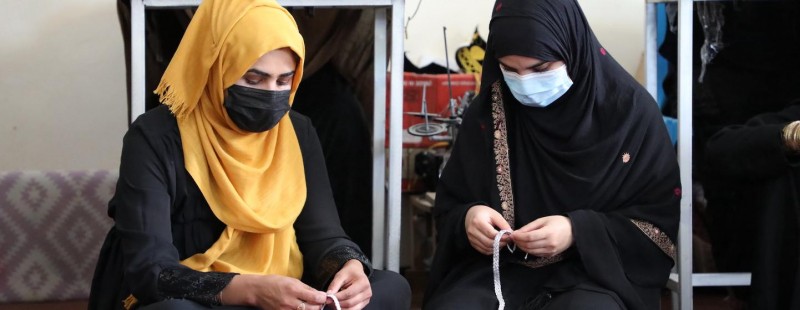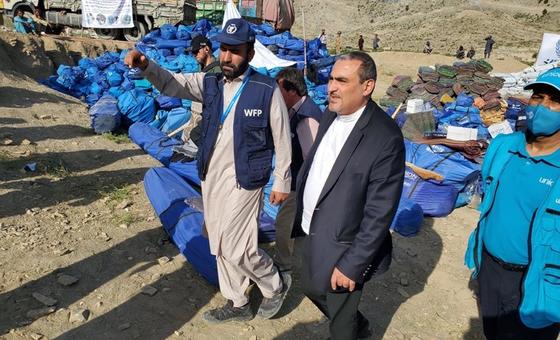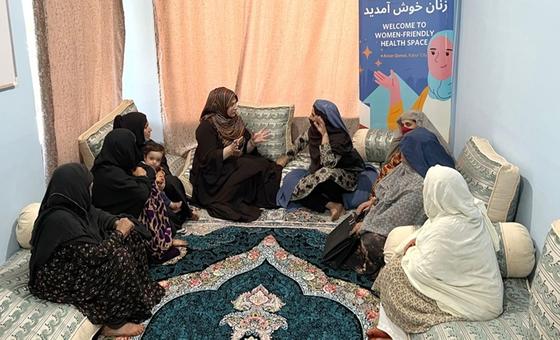UN women’s empowerment centre, Kabul, Afghanistan A year on from the Taliban takeover of Afghanistan, the senior UN official in the country, Resident Coordinator Ramiz Alakbarov, describes his fears for girls’ lives, and calls for women to play a full role in reviving the Afghan economy. “Shortly before the Taliban takeover in 2021, I visited an orphanage in Kunduz, a city in the north of Afghanistan. I was heartbroken when I spoke with a young girl there who had lost her entire family the day before, following intense fighting between the Afghan National Security Forces and the Taliban. Although she was safe from any immediate danger, had access to food, shelter and other life-saving necessities thanks to the support from our UN team on the ground, I knew that her needs and those of other vulnerable children across Afghanistan were far greater, and the problems faced by their communities more complex. Since then, these challenges have grown exponentially and our efforts to build a stable future for children like the ones I met last year in Kunduz have become more demanding. From hunger to chronic poverty, the scale of suffering in Afghanistan continues to rise across many areas since the Taliban advanced on Kabul last summer. Over half of the country’s population now live below the poverty line. Nearly 23 million people are food insecure, many of them severely so, and more than two million children are suffering from malnutrition. In June 2022, a 5.9 magnitude earthquake struck the central region of Afghanistan, killing over 1,000 people and pushing already vulnerable communities to the brink. I am especially worried about Afghan women and girls, whose lives have changed unrecognizably since the Taliban returned to power last summer. Since 15 August 2021, we have seen a significant rolling back of their economic, political, and social rights and a worrying escalation in restrictive gender policies and behaviours. Without the right to education, work and freedom of movement, women now find themselves increasingly relegated to the margins. As these developments began to unfold last year, our UN team vowed to stay and deliver for the people of Afghanistan. Under the auspices of the One UN Transitional Engagement Framework for Afghanistan, the overarching strategic planning document that guides our UN team’s work on the ground, we have been able to save lives whilst sustaining essential services and preserving key community systems. In the first six months of this year alone, we reached 94 per cent of the overall 24.4 million people in need with some form of humanitarian assistance. Vulnerable households were supported with life-saving and life-sustaining food assistance – from emergency rations, to seasonal support, agricultural supplies and nutritious supplements – to healthcare, emergency shelter and non-food items, hygiene and protection assistance. Yet despite our unprecedented response, the needs across Afghanistan remain vast. Rates of food insecurity, poverty and debt have soared since the Taliban returned to power last summer, even if the roots of these problems existed long before 15 August 2021 following decades of neglect and underdevelopment in key public services and infrastructure. Without access to these services, including strong healthcare, a functioning banking system and resilient agricultural sector, the lives of ordinary Afghans will continue to hang in the balance. The people of Afghanistan deserve a serious commitment and sustained investment in their future, which is why, one year into the Taliban takeover, we are redoubling our efforts to strengthen the fundamental pillars of Afghan society, starting with its economy. Guided by the objectives set out in our Transitional Engagement Framework, we will focus on recovering the economy from the bottom up, expanding women’s economic participation and creating more than two million new jobs. With more sustainable sources of income, families will be better equipped to break out of endless cycles of hunger and slowly reduce their dependence on humanitarian assistance. The full return of women to the workforce is essential to transforming Afghanistan’s economy, which is why we are working hard to support women-led businesses and expand employment opportunities for women across the country. Since the majority of people in Afghanistan live in rural areas, we must focus particular attention on sustaining the agricultural economy by strengthening agricultural-food systems and developing stronger links between farmers, food producers and local markets. Our UN team is already implementing these approaches in rural areas across Afghanistan, including in some of the regions affected by the recent earthquakes. Visiting this area in south-eastern Afghanistan earlier this month, one of the young men I met gave me a handwritten note which listed the immediate asks for his village: clean water, homes, education, health, roads and jobs. The message to the UN was clear: support us with these simple requests now and we can better support ourselves through the uncertainties of the future. As we move forward, we will continue to work to improve the lives of people in Afghan – including women and girls. When the Taliban returned to power last summer, we rapidly scaled up the provision of essential health, education and protection services for women and girls. We have expanded this support in recent months, opening new women friendly health spaces in Kabul for increased access to psychological support; scaling up mobile health teams to reach more vulnerable women and children affected by the earthquakes and rolling out more training programmes for displaced and returnee women through our empowerment centres. Whatever uncertainties lie ahead, we will place the needs of women and girls at the centre of our recovery efforts and will work every day to ensure that they return to work, go back to school, and are able to resume their right to live free and equal lives. Thinking back to this day last year, I am proud of the support our UN team has provided the people of Afghanistan, and the efforts we have made to prevent some of the worst-case scenarios that we feared from playing out. Profoundly moved and motivated by ground realities, I look at the challenges ahead, and reiterate our mission to ensure that every person in Afghanistan, including children like the girl from Kunduz, can plan and have a dignified future, well beyond striving for survival today.
Women ‘relegated to the margins’

Decades of neglect
Focus on the agricultural economy

Related Posts
WEJ PROJECTS
© 2009-2025, World Economic Journal. All Rights Reserved. Republishing permitted with attribution and active hyperlink to the original source.

